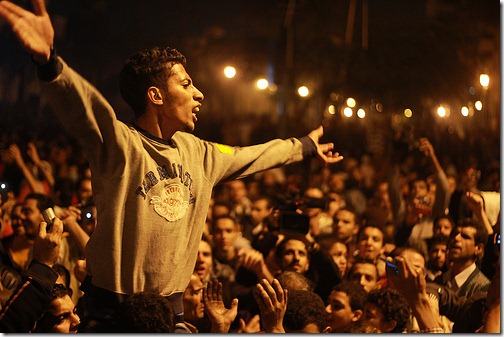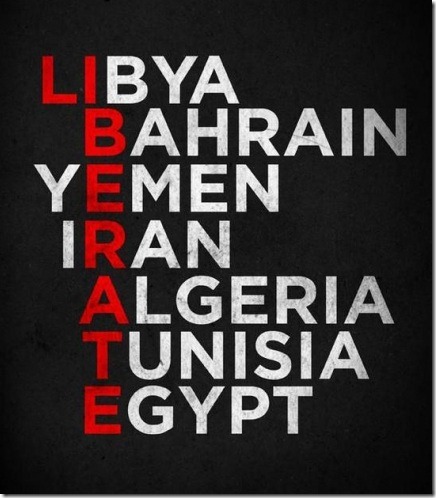 The Arab Spring – a series of public protests and demonstrations that swept through north Africa and other parts of the Middle East from December 2010 (and is still on going in some countries) – has got a lot of people talking about the ‘will of the people’ and how this power might be harnessed to effect change, in the face of societal discontent.
The Arab Spring – a series of public protests and demonstrations that swept through north Africa and other parts of the Middle East from December 2010 (and is still on going in some countries) – has got a lot of people talking about the ‘will of the people’ and how this power might be harnessed to effect change, in the face of societal discontent.
It is difficult to gauge what positive effects to the socio-economic wellbeing of the people in the countries involved resulted from these particular popular uprisings. It would appear, instead, that things have taken a turn for the worse. A number of negative socio-economic effects have been observed:
The Arab Spring revolutions have, ironically, increased the levels of unemployment in the region. A revolution intended to meet the aspirations of the youth has instead resulted in more of them being unemployed.
Egypt witnessed an increase of the unemployment rate during the fourth quarter of 2011 to 12.4% of the labor force, compared to 11.9% for the same period in 2010. The unemployment rate in Morocco reached 30% of people aged between 15 and 29 years up to January 2012. Algeria had the highest unemployment rate of 22%, due to the return of most of the workers from Tunisia, Libya, Syria and Egypt; and Tunisia had an unemployment rate of 18.9% by the end of 2011.
A study by the World Bank last year stressed the need for Arab countries to have 100 million jobs by 2025, only to maintain the current unemployment levels and prevent them from increasing. The study also stated that the unemployment rates in the Arab countries ranged between 25% and 30% in 2011, and these figures are the highest in the world.
In Morocco people have recently taken to going back to the streets in protest, since the changes the people had hoped for have not been forthcoming, even after political reform:
Tens of thousands of Moroccans took to the streets of Casablanca on Sunday in the largest opposition protest since an Islamist-led government took office, reflecting mounting tensions over unemployment and other social woes.
The protest was organised by trade unions which accuse Prime Minister Abdelilah Benkirane of failing to deliver on the pledges of social justice that brought his party to power in the wake of the Arab Spring.
"There are more than 50,000 people who are demonstrating to call on the government to start a genuine dialogue addressing our country’s social ills," opposition Socialist MP Hassan Tariq said.
A official estimated the crowds at between 15,000 and 20,000.
Not much seems to have changed in Egypt either, even in terms of respect human rights:
The Egyptian military junta has intensified its violent crackdown on protesters before the presidential elections scheduled for May 23. On Friday afternoon, military police and security police working with armed thugs brutally attacked protesters in front of the Ministry of Defense at Abbasseya Square in Cairo.
The protesters called for the fall of the US-backed military junta and the execution of its leader, Field Marshal Mohamed Hussein Tantawi.
Military and police forces started their attacks Friday afternoon, claiming that demonstrators had tried to storm the Ministry of Defense. They used water cannons, tear gas and live ammunition against the protesters, who defended themselves with stones. At least two protesters and one soldier were killed and hundreds injured. The military enforced a curfew in the area. According to the “No To Military Trials” activist group, 311 male and 18 female protesters have been arrested and threatened with military trials.
More protests, more violent crackdowns – in short, more of the same from the Mubarak era.
In the face of this, would one be justified in concluding that the Arab Spring has been a failure?
Maybe not.
There are noticeable political changes, for starters, that might be construed as positive. One could say it has encouraged participation of more people in politics, such as the women of Libya, and Islamist parties in Egypt – and that this in and of itself is a good thing. But then, with these political changes, freedom of expression seems to be no better tolerated than it was before:
The four Arab countries where the leaders have been toppled are now in the hands of Muslim fundamentalists, who used the “Arab Spring” as a vehicle to rise to power.
Tunisia’s Islamist party, Ennahda, is already demanding an Islamic state. Human rights activists say that with the arrival of the “Arab Spring,” freedom of speech in Tunisia, instead of growing, has died.
Nabil Karoui, owner of a Tunisian TV station, is currently on trial for blasphemy after airing the French-Iranian animated film “Persepolis,” which features a cartoon depiction of God. About 150 lawyers filed lawsuits against Karoui for “violating sacred values” and disturbing public order.”
Two weeks ago, hundreds of Muslim fundamentalists who follow the radical Wahhabi doctrine of Islam took to the streets of Tunis to demand the implementation of Sharia laws in their country.
Has the Arab Spring been worth the nearly 50,000 lives lost?
Come join the discussion.
The May 2012 Freethinkers’ Night will take place on Thursday, 31st May, at 4 Points Bar & Restaurant, Centenary Park, Kampala, starting 6PM.
Entrance is FREE.
If you are an open minded person whose opinions are formed on the basis of science, logic, and reason and are interested in meeting like-minded individuals – you are more than welcome to join us.





Leave a comment
Comments feed for this article